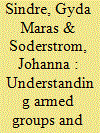| Srl | Item |
| 1 |
ID:
147190


|
|
|
|
|
| Summary/Abstract |
Armed groups often transform into political parties, which involves a profound transformation of the organizational culture. How these parties condition the continued political mobilization of their members is unclear. Using life history interviews with former combatants of the armed group M19 in Colombia, this article demonstrates what aspects of the party mobilize and stymie their political mobilization. Through exploring three typical political life paths – the Resilient, the Remobilized and the Removed – this article demonstrates the long-term challenges of post-war politics, the role of the party, as well as the personal journey from (war and) peace to democracy.
|
|
|
|
|
|
|
|
|
|
|
|
|
|
|
|
| 2 |
ID:
122786


|
|
|
|
|
| Publication |
2013.
|
| Summary/Abstract |
A precondition for sustainable peace and democracy is the acceptance of new ways of solving political problems without resorting to arms. Post-war elections are an important point for testing the legitimacy of the new regime, highlighting the depth of micro-level support for democracy. In the case of Liberia, the most notable problem of the elections of 2005 related to the issue of legitimacy. The ex-combatants did not trust the results and felt abandoned after the elections. Such experiences stand in the way of further deepening democracy in Liberia and may offer the grounds for mobilising anew. Yet, it is only by repeated experiences with elections that a process of democratisation takes place. This article addresses how the second experience with elections has changed ex-combatants' relation with democracy and experience of legitimacy, through re-interviewing a number of ex-combatants concerning their electoral experience from 2005 and 2011.
|
|
|
|
|
|
|
|
|
|
|
|
|
|
|
|
| 3 |
ID:
147184


|
|
|
|
|
| Summary/Abstract |
Political parties with an armed history are not unusual, yet how these groups function in politics after the transition has largely been ignored. This special issue examines armed groups in party politics, using single and comparative case studies. The introduction forwards five recommendations for future research: (1) We need to see more comparisons across taken for granted boundaries; (2) the consequences for democracy should figure more prominently in our analysis of armed groups; (3) think more critically about standards and conceptual tools; (4) critically examine the interaction between levels of analysis; and (5) methodological pluralism would enrich the field.
|
|
|
|
|
|
|
|
|
|
|
|
|
|
|
|